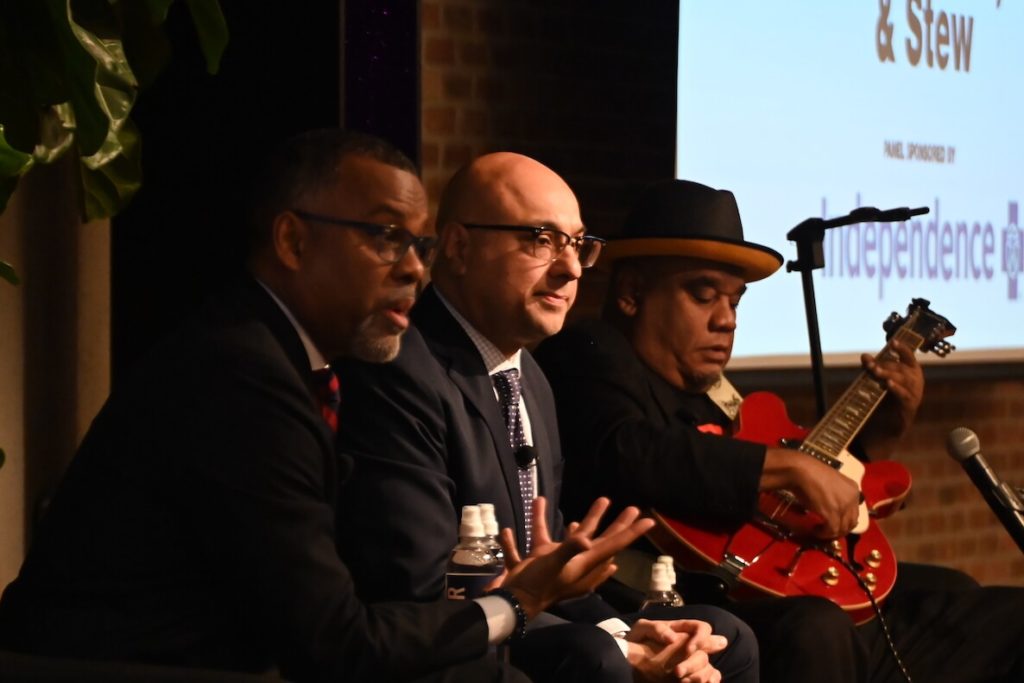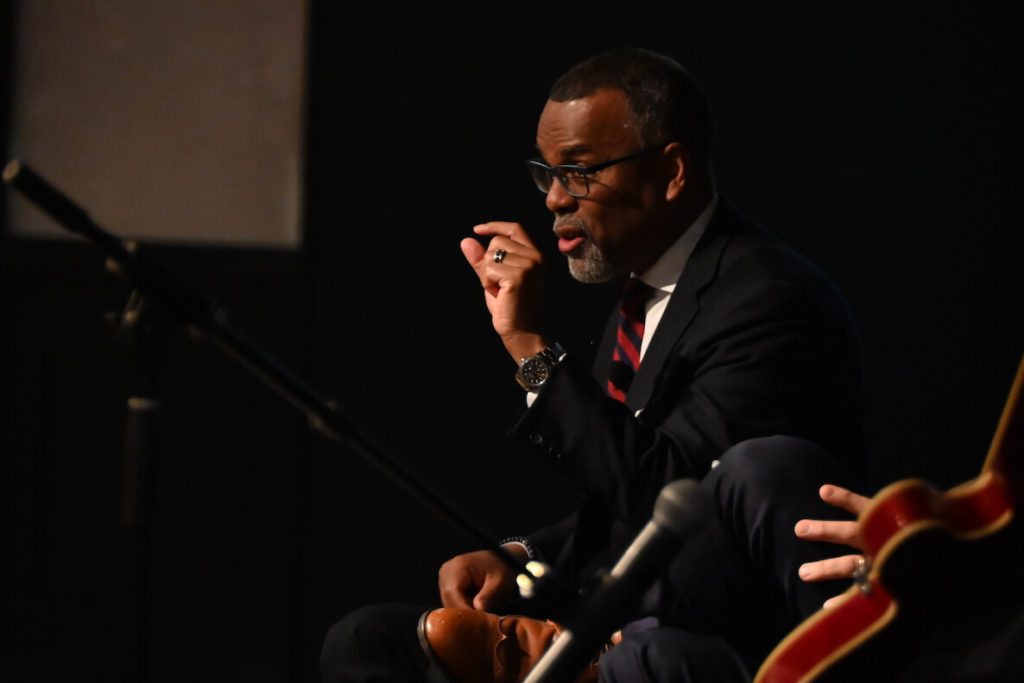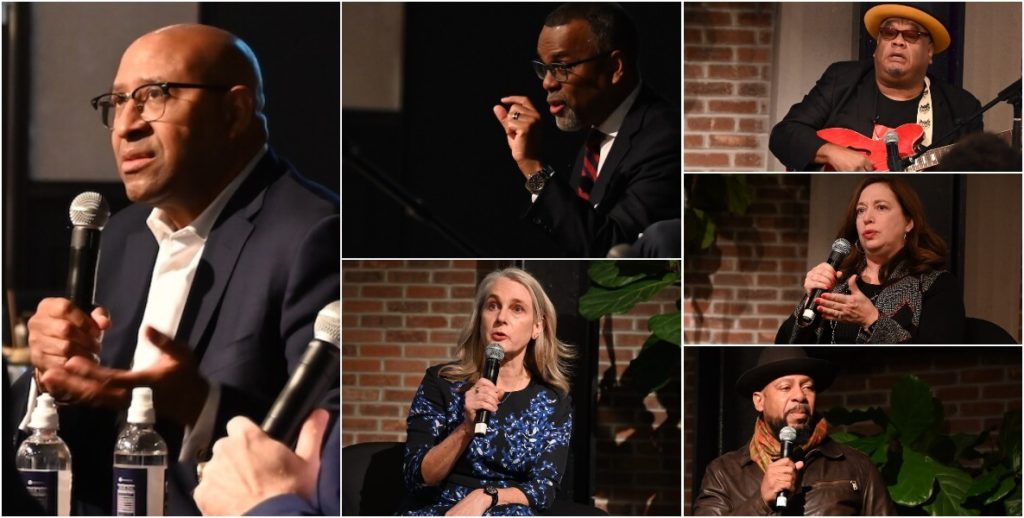We don’t have to reinvent every wheel.
Those words, from MSNBC host and Citizen board member Ali Velshi, are the essence of The Citizen’s Ideas We Should Steal Festival, held this week for the fourth time in as many years. So many great solutions already exist for the problems Philadelphia shares with cities across the country; so many people out there have ideas for fixing what ails us.
We heard from several of those incredible problem-solvers on Monday night and Tuesday during this year’s Ideas We Should Steal Festival, presented by Comcast NBCUniversal and held in the Fitler Club ballroom to a diverse and passionate crowd of (fully vaccinated) engaged citizens.
RELATED: Dig into lots of solutions in our archive of ideas Philadelphia should steal
We learned about how one city is staving off climate change with an innovative electric car share program. One speaker who actually brokered peace between L.A.’s Bloods and Crips shared how he’s having success in his town fighting gun violence through peaceful intervention. We got insight into how empathy and the courage to face often uncomfortable truths can help us repair democracy and stamp out racial discrimination. And we were inspired to borrow all this knowledge to help bring meaningful change to Philadelphia, all in the hopes of bringing us closer to our theme of Life, Liberty and the Pursuit of Prosperity.
Here, some of the highlights from the two-day Festival. If you missed it, be sure to join our upcoming events all year long, and to stay tuned for details about next year’s Festival, which, believe it or not, we’re already hard at work planning.

1. JAMES BALDWIN WAS AHEAD OF HIS TIME—AND IS OF OUR TIME

The event kicked off Monday night, with a panel presented by Independence Blue Cross, with Velshi leading a riveting—and challenging—conversation between Eddie Glaude Jr, professor and author of Begin Again: James Baldwin’s America and its Urgent Lessons for Our Own, and Stew, Tony-winning singer-songwriter and playwright, best known for Passing Strange.

With preacher-like passion, Glaude explained how the great 20th century writer-intellectual James Baldwin was boldly ahead of his time—from writing Giovanni’s Room, a same-sex love story, in 1956, to calling out the racism inherent in every aspect of American society—and how his words are just as relevant today: “Jimmy forces America to look itself in the face—straight, no chaser.”
Stew, playing (and adapting) songs from his musical about Baldwin, Notes of a Native Song, surprised us from the first line he sang: “I’m so fucking tired of James Baldwin,” to the last, which he composed on the spot: “Neo Liberals won’t save us from fascism.” The rock musician-turned playwright and Harvard college lecturer talked about his faith in young people—and disillusionment with adults—who so clearly see our broken system and still have the outrage and imagination to build something different, something better.
Both men challenged the audience to question their own assumptions and motives, in order to make fundamental changes to our society—not just small shifts along the edges. As Glaude put it: “Before you can say anything about the world, you have to deal with the messiness in you.”
2. CAPITALISM CAN DO GOOD
Peter Georgescu, chairman emeritus of Young & Rubicam and author of Capitalists ARISE!, made the case for a kind of capitalism that doesn’t answer only to shareholders, but to stakeholders: workers, communities, and consumers. “Stakeholder capitalism is the only form of capitalism that can survive in a democracy,” he argued, in a panel presented by Comcast NBCUniversal. Anything else, he said, is not sustainable.
During the Q&A, one guest—a self-described capitalist himself—left the crowd with this thought-provoking idea: There has to be a kind of capitalism that allows for slaying the portions of capitalism—for example our inflated healthcare system—that don’t work. Amen.
3. IT’S A MAYOR’S JOB TO KEEP CITIES SAFE
Former Philly Mayor Michael Nutter joined former Atlanta Mayor Kasim Reed, with Citizen co-founder Larry Platt, for one of the liveliest panels, arguing that mayors need to make their citizens feel safe before they can get anything else done.
“If you’re not taking care of fundamentals, people won’t come along for the big things,” Reed said. You need services that address the deep emotional toll of violence in cities. “Washing down a sidewalk does not take away a trauma,” Nutter said. There are children, families, communities affected by violence in our streets. Murder and violence, they agreed, make citizens believe less and less that a city is theirs; thriving cities, and their economies, flourish on the tail of safety. As Reed put it: “You have to shake the public will and make people believe again.”
But also: It isn’t progressivism or conservatism, or anything in between, that matters when getting, uh, stuff done. Or, as Nutter put it in Philly-speak: “You just need to fix the fucking pothole.”
4. COMMUNITIES HEAL COMMUNITIES
In one of the most moving segments of the day, Aqeela Sherrills, the director of Newark Community Street Team, shared the powerful lessons he’s learned while working to reduce violence in communities over the last 30 years, starting with brokering peace between L.A. gangs Bloods and Crips. Namely: You can’t have public safety without the public—when neighborhoods take ownership of their community and work together with law enforcement, people heal. Also: “Where the wounds are is where the gifts lie,” Sherrills said, sharing that his oldest son was tragically killed—and that doing the work he does every day is his way of ensuring that his beloved son’s death was not in vain.
5. PUNISHMENT IS NOT PREVENTION
Piper Kerman, author of Orange is the New Black, and Robert Rooks, CEO of REFORM Alliance, joined journalist Emily Bazelon for a conversation about reforming our broken prison system, in a panel presented by REFORM and Fanatics.
The panelists shared their conviction that both victims and perpetrators need to be supported and healed in the wake of a crime—that the latter need not be isolated further.
If the pandemic highlighted nothing else, Rooks said, it made clear that we need community, we need connection—and that when it comes to overthrowing our prison system as we know it, we need to invest in programs that build both.
6. ENDING POVERTY IS A LONG GAME
Terri Sorenson, executive director of Friends of the Children, and Omolara Fateiregun, CEO of Thrive! traded ideas for putting a dent in generational poverty at a citywide and neighborhood-wide level.
Sorenson emphasized what her organization has found when it comes to supporting children: Start early; stay for the long-term (12.5 years); and pay people to carry out the interventions children need. The real secret sauce, she said? Love.
Fatiregun talked about how Thrive!’s use of technology can help cities assess how well they are addressing the needs of all residents—with parks, with education, with services—so that change can be made systematically, and universally.
In conversation with Bill Golderer, president/CEO of United Way of Greater Philadelphia and Southern New Jersey, which also sponsored the panel, Fatiregun hearkened back to her own mother’s profound influence on her life and work: “Change is possible, and there are no chains that can’t be broken.”
7. ELECTRIC CAR SHARES ARE THE WAY OF THE FUTURE
Russ Stark, chief resilience officer of the City of St. Paul, walked the crowd through his city’s plans to launch a municipal-run, low-cost ($9 per hour) electric car share program, and the importance of doing so if we want to actually cut fossil fuel use.
For those who are still dragging their feet on making contributions to stop climate change, he pointed out that “saving the planet” is not about some esoteric fight; really, it’s about saving humans. And the best part, as he noted: We can do this in Philly. The roadmap is out there.
8. “WE MUST BUILD BRIDGES OF EMPATHY”
We closed out the event with a brief, rousing conversation with UC Berkeley professor and author Arlie Hochschild, whose book Strangers in Their Own Land: Anger and Mourning on the American Right, was a deep dive into Tea Party voters in the years leading up to the election of Donald Trump.
Velshi introduced Hochschild with a call for empathy and listening, something she alluded to as the day wound down: It may be harder than ever to reach across the aisle, but it’s also more important than ever.
9. OUR AUDIENCE IS THE ABSOLUTE BEST
You came. You listened. You took notes. You gave standing ovations. You asked amazing, thoughtful questions that took the conversations to whole new levels. We can’t thank you enough for being part of our community. You truly rock. 🙏

